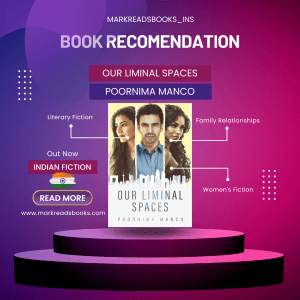Our Liminal Spaces by Poornima Manco is a moving and deeply thought-provoking novel that invites readers to reflect on their own lives and the choices they make


Synopsis: Our Liminal Spaces
Our Liminal Spaces by Poornima Manco is an evocative exploration of identity, relationships, and the spaces we occupy between tradition and modernity, self and society. Set against the rapidly transforming landscape of Gurgaon, a city on the outskirts of Delhi, the novel delves into the lives of three complex characters whose paths intertwine in ways that reshape their understanding of themselves and each other.
At the center of the story is Radha, a young Indian wife who is caught between her own desires and the rigid expectations of her conservative in-laws. Despite her love for her husband Shyam, Radha feels stifled in her role as the dutiful daughter-in-law. Educated and ambitious, she longs to use her talents and knowledge, but the traditional framework of her marriage leaves little room for personal fulfillment. As Radha struggles with the tension between societal expectations and her inner aspirations, her life feels like a delicate balancing act between duty and self-expression.
Everything changes when Radha meets Mira, her free-spirited and unconventional neighbor. Mira’s independence, boldness, and willingness to defy societal norms offer Radha a glimpse of an alternate life—one that is more liberated, where she can pursue her passions and ambitions without fear of judgment. As their friendship deepens, Mira becomes a catalyst for Radha’s personal awakening, stirring within her a desire to break free from the confines of her traditional life. Yet this newfound sense of self is not without its complications.
At the heart of the novel is the relationship between Radha, Shyam, and Mira—a dynamic triangle that challenges each character’s understanding of loyalty, trust, and love. Shyam, devoted to his wife, finds himself caught in the web of emotions that emerge as Radha begins to change and her bond with Mira intensifies. As the boundaries between friendship and deeper emotional entanglements blur, the trio grapples with difficult questions about fidelity, personal freedom, and the sacrifices we make in the name of love.
Manco deftly portrays the shifting power dynamics and emotional complexities that arise as Radha and Shyam’s marriage is tested by both internal and external forces. The novel captures the intimate struggles of a woman who is torn between two worlds—her duty to family and tradition, and her yearning for personal growth and fulfilment. Mira, too, faces her own dilemmas as her relationship with Radha and Shyam becomes increasingly complicated.
Review of our Liminal Spaces
Exploring Cultural and Emotional Depths in Our
Our Liminal Spaces by Poornima Manco is a beautifully layered novel that spans 25 years, following the interconnected lives of three Indian characters—Radha, Shyam, and Mira—who are all navigating the complex space between tradition and modernity. Set against the rapidly changing socio-cultural backdrop of India around the turn of the millennium, the novel deftly examines how cultural expectations, personal choices, and societal evolution shape these individuals as they struggle to balance old-world values with new-world aspirations.
At its core, Our Liminal Spaces is a story of personal growth and the sacrifices people make in their attempts to reconcile who they are with who they want to be. Each character is deeply rooted in the fabric of Indian culture, yet each is also striving to break free from the confines of societal expectations, be they familial duties or gender roles. This makes the novel both a universal and culturally specific exploration of identity and self-discovery.
A Structure that Mirrors Life’s Fragmented Realities
The novel’s structure, told from the shifting perspectives of Radha, Shyam, and Mira, reflects the fragmented and multi-dimensional nature of life itself. Manco uses this format to great effect, allowing readers to see each character’s story unfold individually before moving on to the next, with each shift offering new insights into how their lives are intertwined. The narrative doesn’t overlap, but the consequences of one character’s choices reverberate through the lives of the others, even when they’re unaware of the full scope of events.
What stands out in this approach is the time jumps between perspectives, which often span months or even years. These jumps not only enhance the sense of change and progression in the characters’ lives but also underscore the emotional and cultural shifts happening around them. Readers are often left to fill in the blanks, piecing together how earlier actions shaped later outcomes—much like life itself, where we often don’t fully comprehend the ripple effects of decisions until much later.
Universal Themes Through a Distinct Cultural Lens
One of the most striking aspects of Our Liminal Spaces is how it portrays universal themes like love, loss, betrayal, and forgiveness, but through the distinct lens of Indian culture. Radha, for instance, is a young woman caught between her duty to her conservative in-laws and her desire for independence. Her struggle mirrors that of many women worldwide, but the specific cultural nuances—such as the expectations placed on women within traditional Indian families—give her story a unique depth.
Shyam, her husband, is also grappling with similar tensions. He wants to support his wife, but he is equally bound by the expectations of being a dutiful son and husband in a society where family honor often takes precedence over personal happiness. Mira, the bohemian neighbor, represents a counterpoint to Radha and Shyam’s more traditional lives, offering a glimpse of what could be possible if societal norms were disregarded.
This exploration of old versus new is one of the central themes of the novel. As India undergoes rapid modernization, each character is forced to confront their place within this changing landscape. They must decide whether to embrace the new freedoms it offers or to remain anchored in the traditions that have long defined them. This tension is a powerful driving force throughout the novel, making it not just a story about individual growth, but about the broader cultural shifts that impact every aspect of life.
Cultural Representation and Inclusion
Poornima Manco does an excellent job of incorporating diverse representations within the novel, including a character with Down syndrome. While this character does not take centre stage, her inclusion is handled with care and sensitivity. She is not merely a plot device, but a fully realized character whose presence adds richness to the narrative. Her story, like that of the other characters, is about navigating the complexities of life, albeit from a different perspective.

Manco’s inclusion of this character highlights the broader theme of empathy and understanding—how we treat those who are different from us, and how they in turn shape our understanding of the world. While her disability is part of her identity, it is not the sole focus of her character, which allows for a more nuanced portrayal.
The Emotional Weight of Time
One of the most powerful elements of Our Liminal Spaces is its exploration of time and its emotional impact on the characters. Over the 25 years that the novel covers, the characters experience significant losses—of loved ones, of relationships, and of the dreams they once held dear. The deaths that occur are not sensationalized but are instead presented as natural, albeit heart-breaking, parts of life.
This emotional realism gives the novel its gravitas. Readers aren’t taken on a rollercoaster of shocking twists and turns but are instead invited to witness the slow, often painful process of healing, reconciliation, and self-discovery. In many ways, the novel is more about the journey than the destination—how the characters come to terms with their past choices and how they move forward with the weight of those decisions.
Conclusion: A Culturally Rich and Emotionally Resonant Story
Our Liminal Spaces is a moving and deeply thought-provoking novel that invites readers to reflect on their own lives and the choices they make. Poornima Manco has crafted a narrative that is both culturally rich and universally resonant, making it accessible to readers from all backgrounds. Through the lives of Radha, Shyam, and Mira, Manco explores the liminal spaces we all occupy—the in-between moments where we define who we are and who we want to be.
The novel’s exploration of identity, relationships, and cultural expectations is both timely and timeless, offering readers a glimpse into the complexities of life in modern India while also reminding us that some struggles—those for love, freedom, and self-acceptance—are universal. For anyone who enjoys character-driven narratives with emotional depth and cultural nuance, Our Liminal Spaces is a must-read.
Meet : Poornima Manco

picture
Poornima is an award-winning novelist whose short stories have been published in The Guardian and The Telegraph newspapers in the UK. Born and raised in India, she still retains a deep connection to her motherland, which reflects in all her stories and books. Poornima lives in the UK with her family.

by Poornima Manco
Pinterest pin
Go to see some more Insightful Book Reviews Or here to add Our Liminal Spaces by Poornima Manco your GoodReads TBR
Like follow or share if you would want similar content.
Above all Keep Safe and treat people fairly.
Mark.